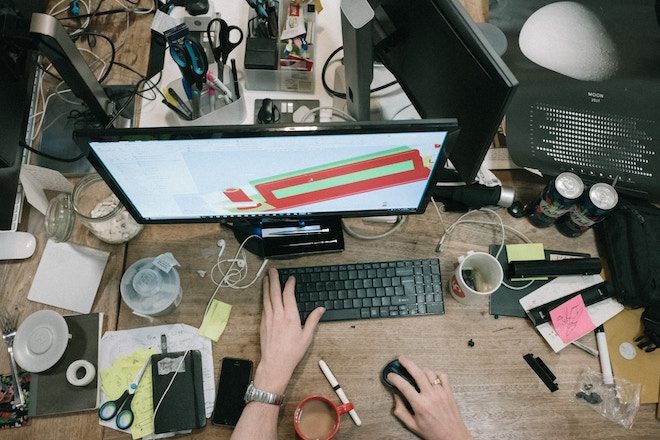What It’s Really Like To Work As A Mechanical Engineer
Keiren Muir studied mechanical engineering, but his path to employment wasn't so clear-cut.

For those who study something a little more vague, like arts, you’ll know that your degree will never equal a career. Not in the traditional sense, anyway. You’ll learn theories, build empathy, and have screaming matches about Foucault, but it certainly won’t give you real-world “skills”.
STEM students, on the other hand, do learn skills. And complex processes. They study for four years, sit their exams and boom: they’ve got a job. Life sorted, right?
Well, not really. Keiren Muir studied mechanical engineering, but his path to employment wasn’t so clear-cut. In fact, he had just as many concerns about what he wanted to do with his life as your typical arts grad would. Now, working as a mechanical engineer for the Department of Defence, he’s glad he was so unsure — it led him to where he is.
As part of Uni Junkee’s ‘Work Experience’ series, we asked Keiren about the day-to-day life of his job, and how he finally figured out the right path for him.
—
Uni Junkee: So, um, what exactly do you do?
Keiren Muir: I’m a mechanical engineer working for the Department of Defence within the Naval Technical Bureau, which is a key part of the technical authority for the Australian Navy.
As a mechanical engineer, I work within the area specialising in auxiliary mechanical systems. This covers all of the mechanical systems required to keep ships running and people alive. Some examples being: heating, ventilation and air conditioning systems, fluid transfer systems, water production facilities, firefighting systems and hydraulic systems.
The nature of our organisation is to provide technical advice on everything relating to procurement and sustainment of the Navy Fleet. This technical advice extends to functional testing, physical inspections and design review and recommendations.

How did you find work after uni?
My post university work life has been… interesting. I didn’t have a clear path of where I wanted to work after I graduated. It was actually always my plan to travel after uni. Towards the end of my final year, I received an email from my uni detailing the Defence Engineering Internship Program, which interested me because it would give me the opportunity to work in Darwin for three months on a Defence construction project.
Upon completion of the internship, I couldn’t leave the project — it was very interesting work and the team I was working with were incredible. In addition to exposing me to complex construction processes and on-site engineering tasks, I also gathered an understanding of the amazing technology and platforms within the Defence sector.
As the nature and direction of the work changed in Darwin, I decided in was time to continue with my travel plans before I lost the opportunity altogether. While I was travelling, I was referred to the Civilian Engineering Development Program by a friend. I applied and this lead to the role I am in now.
Before commencing this role, I capitalised on any practical role I could take up. These hands-on roles have provided great experiences I can draw on within my current role (even though they’re not directly related).
One of the key things I want to emphasise is that like most people during university, I did not have a clear path of what I wanted to do. I’m now thankful for that mindset as it enabled me to capitalise on many great opportunities that I would have been deprived of had I taken a long-term graduate role immediately.
6am – Wake up.
6.30am — Go to the free defence gym.
8am – Start work. Check and respond to emails, administration, organisational and planning tasks, skim defence news summary.
9am – Work on current projects such as reviewing engineering documentation, providing technical advice into procurement or sustainment tasks, develop test plans, develop reports, review defence internal standards.
12pm – Lunch.
12.30pm– Continue work on current projects. There are frequent branch and project specific meetings, although they are not a daily occurrence.
4.30pm – Home time.
What do you think you’ve learned on the job they didn’t teach you at uni?
I have found work life teaches you the skills you need to function within your role, whereas university provides a good technical understanding of a broad number of areas.
Also, a lot of the soft skills that are required within the workplace are not specifically taught within the university environment and are best learned by doing on the job.
I need to define what I’m aiming for now, and there is no right or wrong answer to that question. That is a scary concept.
What’s something you didn’t expect about working full-time?
One of the things I’ve been surprised about is the amount of opportunity but also, the lack of clear direction compared to university. My whole university life was committed to getting the piece of paper at the end, whereas there’s not such a clear goal in the real world.
I need to define what I’m aiming for now, and there is no right or wrong answer to that question. That is a scary concept.
What’s the best part of your job? And the worst?
The best part of my job is how varied the work is. One week I’ll be travelling to do testing on a ship somewhere, another week I’ll be reviewing engineering design documents.
It’s challenging and allows me to learn about the many different things required for a ship to operate. The worst part would be having to deal with some of the processes that are a necessary part of an organisation as large as Defence.

Any advice for graduates looking to get a job in your field?
It’s a good time to get into the Defence environment at the moment. I would recommend anyone that is interested do some research and find out the good and bad points of working in this field to see if it is for you.
The good thing is there are so many ways to work in the Defence environment and there are so many outreach programs by Defence to give you a taste of what it’s like. I would recommend the civilian engineering development program as an entry into Defence as it gives you great exposure to a range of different areas in defence and in the private defence industry.
What would you say to students who don’t know what to do after they graduate?
I could tell you, like everyone else, the importance of research or to talk to everyone to learn from them. But this advice is so generic and won’t help when you’re struggling to decide what to do after university.
Thinking back, I believe the best advice I could have received is that you can’t predict your whole path based on the experience you currently have. All you can do is capitalise on an opportunity that interests you, regardless of what everyone else says. Once you have capitalised on one opportunity, another will open the door and there is no way of predicting where the door will open or how it opened.
If you start with an opportunity that doesn’t interest you, because it pays well, or other pressures push you into it, then you will miss out on so many opportunities that you were passionate about.
Josephine is the Editor of Uni Junkee. She knows very little about mechanical engineering.